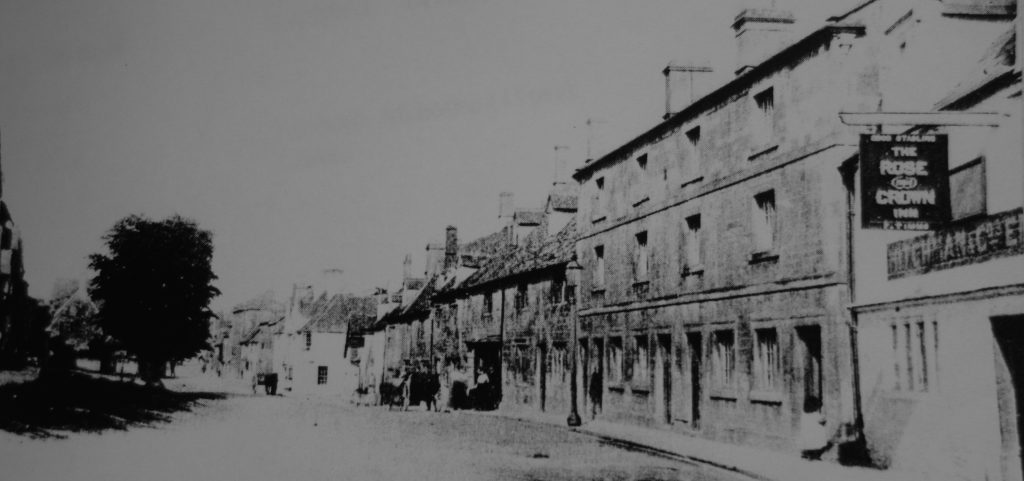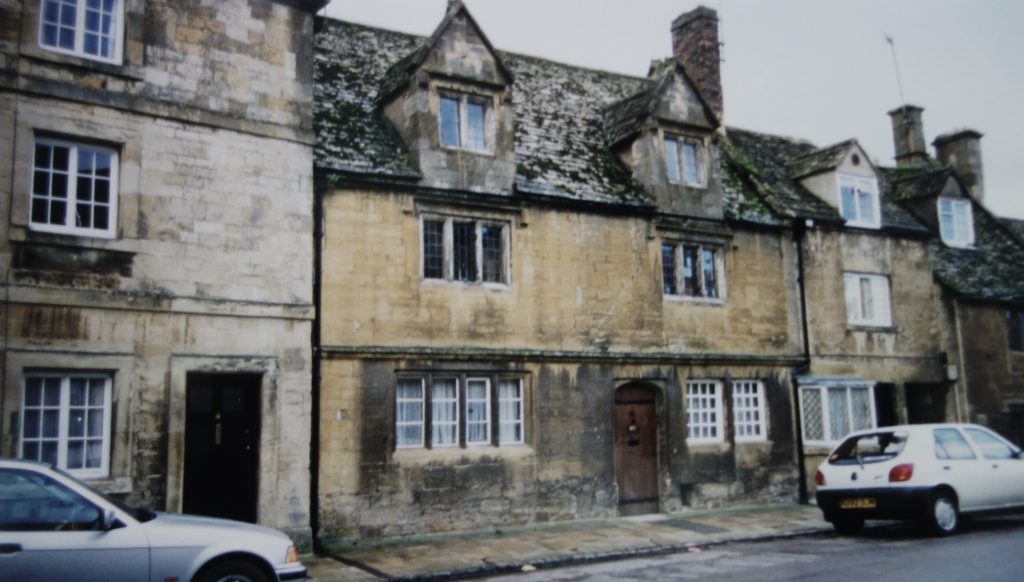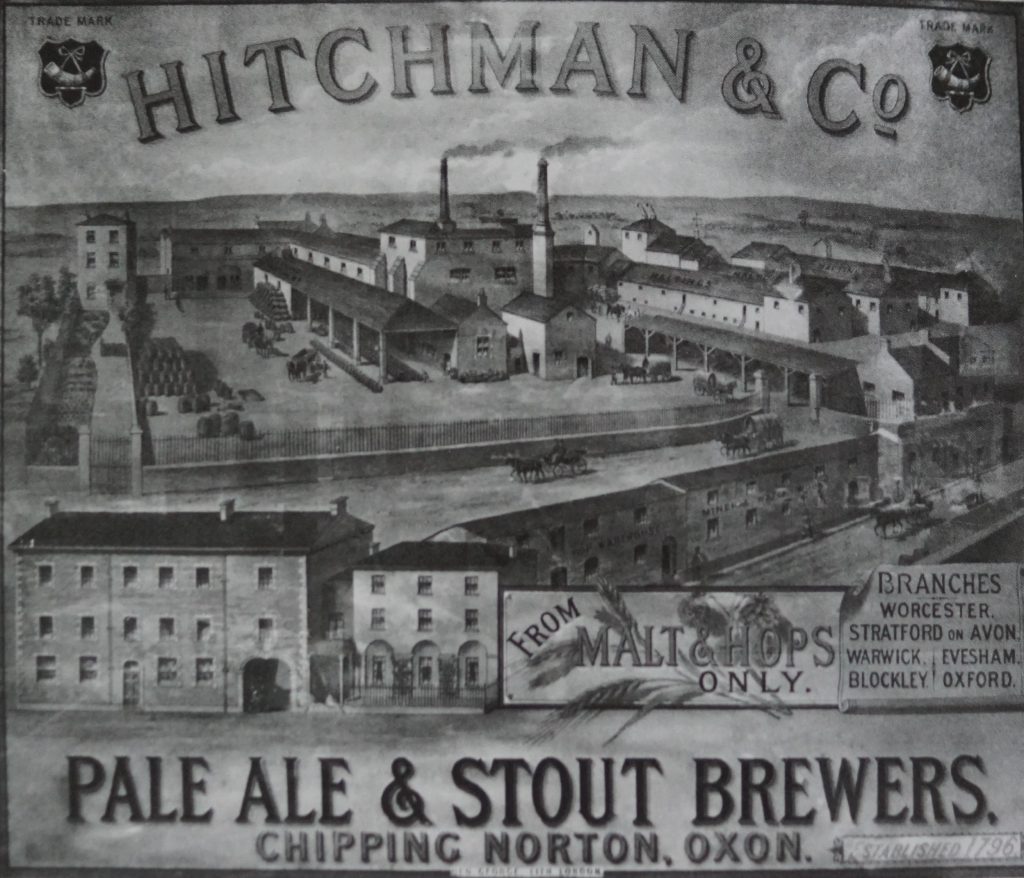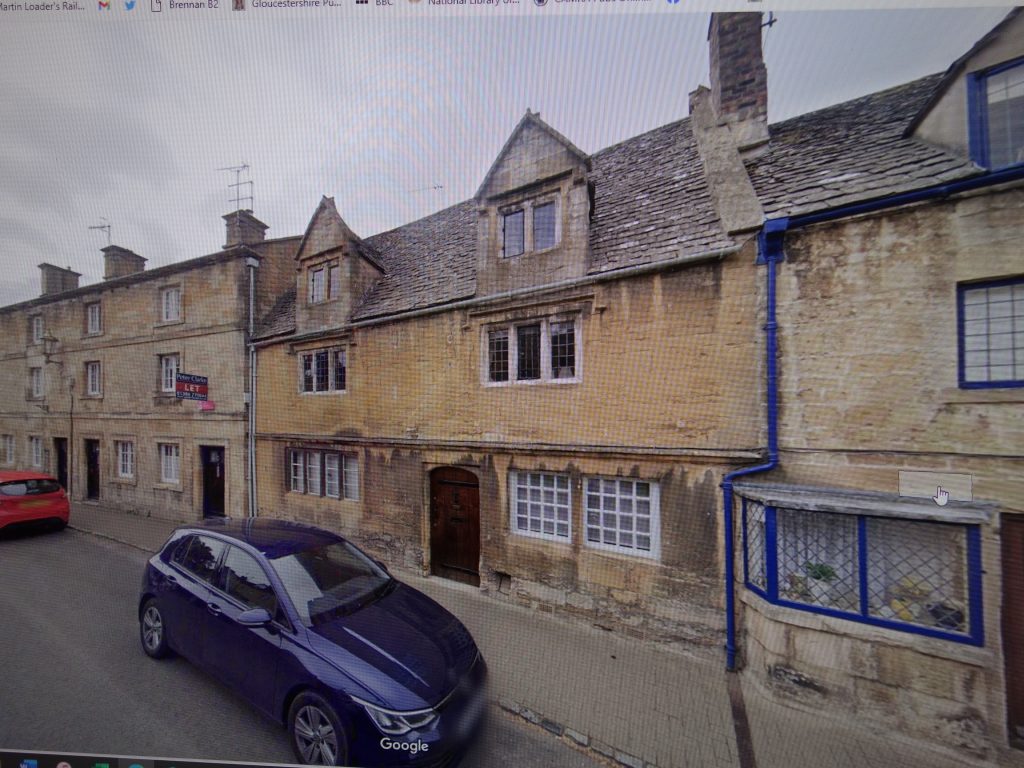The building that was once the Rose & Crown is a typical Cotswold stone Chipping Campden house with two small gables, but nothing visible to suggest that it was once a licensed premises.


From ‘The Inns and Alehouses of Chipping Campden and Broad Campden’ (Chipping Campden Historical Society) Reproduced with permission.
The Rose & Crown is now a private house. It is a seventeenth-century building with two gables, mullioned windows with hood moulds, and a Tudor style doorway with an oak door. The Brewhouse near to it has very similar windows and was possibly part of the old pub.
The Rose & Crown was a Tudor inn sign indicating the loyalty to the monarch, but it is very doubtful if the pub itself had a very old licensed history. The 1838-64 deeds of Elm Tree House mention The Rose & Crown.
At the Petty Sessions in October 1871 The Rose & Crown was transferred from Phipps to John Hartwell; the superintendent of police said Hartwell was a timber and coal dealer. The applicant here interposed that he had done a bit of anything and something of nothing for a living. The chairman said, “Don’t you think you could do better than keep a public house?” Hartwell sad, “I will keep my house as it ought to be and if the company don’t keep themselves right I’ll stop the tap.” The application was granted. Later that year, at the annual Mop, John Hartwell roasted a pig outside the Rose & Crown, but attendance at the fair was very low, and it was said to be “one of the dullest statutes.” A statute was a meeting of servants for hire otherwise known as a Mop.
On 30th May 1874 there was a serious fire at The Rose & Crown; a chimney fire ignited two beams, which apparently smouldered all day and night. It burst into flames in The Rose & Crown and the neighbouring house, the property of J. Rimell and J. Haydon. C. Ladbrook, J. Keen, B. Sharp and Supt. McRae all helped to control the fire.
The innkeeper in 1891 was Frederick Timms. In 1903 he cut his throat with a razor and sadly died a few hours later. His wife of six months said he was in good health but was being treated for internal pains. Four weeks before he had lost his horse, but a little over £3 had been collected for him towards another. Timms was found in the washhouse with a razor. Supt. Jones and Dr Dewhurst came but they could not save him. Short Ann Bennett (there being a tall Ann Bennett) laid him out.
Mr Fred Coldicott remembers the Rose & Crown closed at the time of the First World War. This was the favourite pub of “Slap” Blakeman (so called because he slapped his whip against his thigh), famous boozer and colt-breaker, who lived in a cottage up behind Old Poplars Farm. As a result of these two occupations he had broken nearly every bone in his body. One leg was badly crippled, but when the doctor told him it was “old age” he replied, with his characteristic stammer, “The other b-b-bugger’s all right and it’s exactly the same age.”
Slap got a local lad to push him in a basketwork wheelchair. The regular itinerary was The Rose & crown, The Volunteer, round Back Ends to The Eight Bells in Church Street. One evening, coming down the slope of Back Ends to Aston Road, the lad let go of the chair, and Slap rolled onto the main road, where he overturned and fell out. Under his rug he had a bottle for urinating in as he progressed around the town, and in his mishap this was broken, A charitable old lady, Miss Griffiths, known as the Angel of Campden, always kind to the poor, witnessed his accident and rushed to help him. “I’m not hurt,” he said, “but” – waving the broken urine bottle – “I’ve lost all my whisky.” She gave him the money for a replacement.
On another occasion, according to Mr Allan Warmington, Slap was driving some people home in his cart. Very drunk, he whipped up his horse, shouting, “Have you ever been thrown out? You’re going to be tonight.” Another night, over his cups, Slap sold someone a donkey for five pounds. The next day the man came him to him complaining. “That donkey you sold me is dead.” Slap replied, “I thought it was when I saw it in the field this morning.”
In 1918 The Rose & Crown, then known as a cider house, was one of six pubs that lost their licences. Mrs Ellen Bridge, the licensee, pleaded at the Petty Sessions that her husband had been in the Army during the war. She had three children and her husband was now in France. Trade was good, there were club meetings fortnightly with fifty-eight members. But the police objected that the entrance to the stables was through the house, there was no Jug & Bottle, the urinal was rough, and there was poor accommodation for the licensee. Hitchman & Co., who owned the pub, said the Company held an option of purchase on an adjoining property, and if the Bench thought it desirable would exercise that option to improve the private part of the premises. The outcome was that Mrs Bridge lost her licence, but on the vicar’s advice went to see the owner of The Red Lion, and took that on, making a deal with the brewery.


Licensing Details:
Owner in 1891: Hitchman & Co., Chipping Norton
Rateable value in 1891: £9.13s.4d.
Type of licence in 1891: Beerhouse
Owner in 1903: Hitchman & Co., Chipping Norton
Rateable value in 1903: £12.0s.0d.
Type of licence in 1903: Beerhouse
Closing time in 1903: 11pm
Landlords at the Rose & Crown include:
1838 Benjamin Blackman
1843 Michael Howley
1853 Thomas Howley
1864 Frederick Phipps
1871 John Hartwell
1881 – 1886 John Waine
1866 Frank Randell (Oct)
1891,1903 Frederick Timms
1918 Mrs Ellen Bridge

